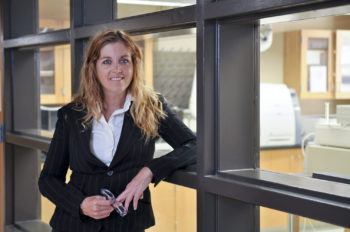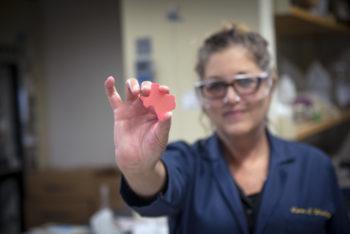Texas A&M Chemist Karen Wooley Elected To National Academy Of Sciences

Texas A&M University Distinguished Professor of Chemistry Karen L. Wooley has been elected to the National Academy of Sciences.
Wooley, holder of the W.T. Doherty-Welch Chair in Chemistry and one of the world’s top chemists in the burgeoning field of materials and polymer chemistry and in creating new materials at the nanoscale level, is among the 120 new members and 26 foreign associates announced Monday, April 27)by the Academy on the final day of its 157th Annual Meeting in recognition of their distinguished and continuing achievements in original research. Election to Academy membership is a widely accepted mark of excellence in science and is considered one of the highest honors that a scientist can receive.
The 2020 election brings the total number of active members to 2,403 and the total number of international members to 501. International members are nonvoting members of the Academy, with citizenship outside the United States.
“All of us at Texas A&M are delighted that Dr. Wooley has received this prestigious recognition,” said Texas A&M President Michael K. Young. “National Academy memberships not only attest to the impressive achievements of an individual researcher, they also elevate academic excellence across the institution. Her election to the Academy is a well-deserved credit to her groundbreaking work in the field of chemistry, as well as an honor to our entire university community.”
A member of the Texas A&M Department of Chemistry faculty since 2009, Wooley also holds joint appointments in the Department of Chemical Engineering and Department of Materials Science and Engineering. In addition, she serves as director of the Laboratory for Synthetic-Biologic Interactions. She was appointed as a distinguished professor in 2011 and was named one of Texas A&M’s 24 inaugural Presidential Impact Fellows in 2017. She also serves as chief technology officer for United Kingdom-based Teysha Technologies, which signed a sponsored research agreement last year with Texas A&M to streamline degradable polymers development and expand the scope of bioplastics technology developed within the Wooley Laboratory.
“Being elected as a member of the National Academy of Sciences is a remarkable achievement and well-deserved recognition of Dr. Wooley’s tremendous impact in the field of chemistry,” said Texas A&M Provost and Executive Vice President Carol A. Fierke, a fellow professor of chemistry with a joint appointment in the Department of Biochemistry and Biophysics.
Wooley is the most recent faculty member to earn the prestigious accolade while at Texas A&M since fellow Distinguished Professor of Chemistry Dr. Marcetta Y. Darensbourg and Distinguished Professor of Mathematics Dr. Ronald A. DeVore were elected in 2017. Other Academy members among the current Texas A&M faculty include Dr. Leif Andersson (2012), Dr. Dudley R. Herschbach (1967), Dr. Roger E. Howe (1994), Dr. Robert C. Kennicutt Jr. (2006), Dr. David M. Lee (1991), Dr. Darwin Prockop (1991), Dr. Peter Rentzepis (1978), Dr. Ignacio Rodriguez-Iturbe (2010), Dr. Marlan O. Scully (2001), Dr. Patrick J. Stover (2016) and Dr. James E. Womack (1999), along with emeritus professors Dr. Perry Adkisson (1979) and Dr. Max D. Summers (1989). Of those Texas A&M 16, seven (Adkisson, Darensbourg, DeVore, Scully, Summers, Womack and Wooley) were elected during their time at Texas A&M.
“Karen Wooley is a brilliant scientist with all the skill sets required to achieve the level of recognition that is deserved,” Darensbourg said. “Chief in my mind is her extraordinary ability to organize. That is what science is, after all. In her research, she coaxes small organic molecules to organize into larger and larger composites that fold into intricate and useful shapes of soft materials. She has an exceptional ability to organize and inspire coworkers and collaborators into teams that are effective in tackling complex problems. As a co-editor of the prestigious Journal of the American Chemical Society, handling hundreds of submissions per year, she maintains the standard of excellence for which the journal is so well known. Her energy unabated, she also teaches and serves the College of Science and Texas A&M University, most recently as an overseer of the seven-year external review of the Department of Chemistry.
“Congratulations, Karen. We are so fortunate to have you as a colleague.”

Wooley’s groundbreaking work in organic nanomaterials-based chemistry spans the gamut of basic and applied research that affects a host of biomedical, environmental and engineering-related areas and industries. Her research interests include degradable polymers derived from natural products, unique macromolecular architectures and complex polymer assemblies, and the design and development of well-defined nanostructured materials. Current projects focus on the development of novel synthetic strategies, fundamental study of the materials’ properties and exploration of their functional performance in the diagnosis and treatment of disease, as non-toxic anti-biofouling or anti-icing coatings for the marine environment, as materials for microelectronics device applications, and as pollutant remediation systems.
“My laboratory has always had a balance of fundamental basic science investigations that have allowed us to create materials that have never been created before and then to study their properties,” Wooley said. “The process we use is going from an idea to a hypothesis to a design of a material that logically would meet that hypothesis. Once we understand how the materials behave and how their composition and structure relates to their properties, then we can define potential applications for those materials.”
Recent achievements made possible by Wooley and her research group include a sustainable plastic that degrades in water; a wound dressing that the body absorbs; a non-toxic polymer coating that can prevent marine animals from sticking to a ship’s hull; and nanoparticles that can absorb 10 times their weight in spilled crude oil.
“Election to the National Academy of Sciences is a tremendous honor, and I think Dr. Wooley’s contributions to environmental sustainability make her election even more noteworthy,” said Dr. Valen E. Johnson, dean of the College of Science. “The College of Science is thrilled with her selection.”
In addition, Wooley served for more than 10 years as the director of a $33 million Program of Excellence in Nanotechnology (PEN) funded by the National Heart, Lung and Blood Institute in support of nanoparticle-focused research expected to dramatically alter the future of medical practice with regard to detection, diagnosis and treatment of lung and cardiovascular diseases. Her research, education and outreach activities have been continuously supported for nearly 30 years by the National Science Foundation, along with a host of additional federal and state agencies, corporate and industry partners and private foundations.
“Karen is one of the most influential and innovative organic polymer chemists today,” said Dr. Simon W. North, professor and head of Texas A&M Chemistry. “The breadth of her scientific accomplishments and the boundless energy she demonstrates in tackling challenges is absolutely awe-inspiring. It is a joy to celebrate in the well-deserved recognition of a colleague who continues to be a tremendous departmental leader, mentor, educator and role model for us all.”
Wooley is a Fellow of the Royal Society of Chemistry (2014), American Academy of Arts and Sciences (2015), National Academy of Inventors (2019) and American Institute for Medical and Biological Engineering (2020). Her major career awards to date include the Royal Society of Chemistry’s 2014 Centenary Prize and the American Chemical Society’s 2015 Oesper Award. No stranger to trailblazing accomplishment, she previously made history in 2014 as the first woman to receive the ACS Award in Polymer Chemistry, a prestigious accolade honoring outstanding fundamental contributions and achievements toward addressing global needs for advanced polymer systems and materials.
“Honestly, it is neither possible to describe the magnitude of this honor nor to sufficiently express the immense gratitude I feel for the contributions that have been made by many talented students, collaborators, mentors, supporters, family and friends,” Wooley said with regard to her most recent career accolade. “I feel exceptionally fortunate to have professional and personal opportunities to pursue my scientific passions and translate academic research into materials that are designed to address global challenges while educating and training dynamic next-generation scientists.”
Wooley earned her Ph.D. in polymer/organic chemistry from Cornell University in 1993 and began her independent academic career that same year as an assistant professor of chemistry at Washington University in St. Louis. She was promoted to professor with tenure in 1999 and named a James S. McDonnell Distinguished University Professor in Arts & Sciences in 2006 prior to receiving a joint appointment in the School of Medicine, Department of Radiology in 2007.
This article by Shana Hutchins originally appeared on the College of Science website.





